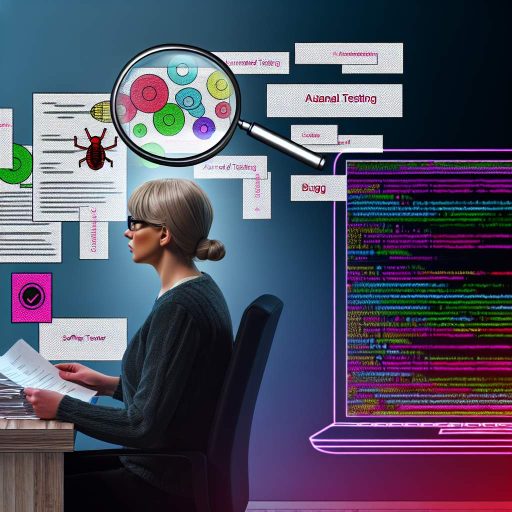Introduction:
IT Risk Manager: An IT Risk Manager is a professional responsible for identifying, assessing, and mitigating IT-related risks within an organization.
This role plays a crucial part in safeguarding sensitive information and ensuring the security of digital assets.
Importance of Balancing Skills: Balancing technical and business skills is essential for an IT Risk Manager as they need to understand both the technical aspects of IT systems and the business implications of potential risks.
By blending these skills, they can effectively communicate with technical teams and stakeholders to implement comprehensive risk management strategies.
Increasing Demand: With the rapid digitization of businesses and the growing threat landscape, the demand for skilled IT Risk Managers is on the rise.
Organizations are recognizing the need for professionals who can navigate the complexities of IT risk management and ensure the continuity of operations.
Technical Skills Required for an IT Risk Manager:
To excel in this role, IT risk managers need to possess a comprehensive set of technical skills.
Knowledge of cybersecurity is crucial as IT risk managers are responsible for identifying and mitigating security threats.
Understanding data analysis is essential for interpreting and analyzing risk-related data to make informed decisions.
Familiarity with risk assessment tools is necessary to assess the potential impact of risks on an organization’s IT infrastructure.
IT risk managers can benefit from acquiring technical certifications that demonstrate their expertise in the field.
Certifications such as Certified Information Systems Security Professional (CISSP) or Certified Information Security Manager (CISM) can enhance their credibility.
Staying up-to-date with technology trends is paramount for IT risk managers to stay ahead of evolving cybersecurity threats.
Continuous learning and professional development help IT risk managers adapt to new technologies and emerging risks.
Business Skills Required for an IT Risk Manager:
Effective Communication: An IT risk manager must communicate complex technical risks in a clear and understandable manner to stakeholders.
Problem-Solving: The ability to analyze situations, identify potential risks, and develop solutions is crucial for an IT risk manager.
Strategic Thinking: IT risk managers need to think proactively and foresee potential risks that could impact the business.
Understanding Business Operations:
Having a strong understanding of business operations is essential for an IT risk manager. It allows them to identify vulnerabilities within processes that could lead to potential risks.
Building Relationships with Stakeholders:
Developing strong relationships with stakeholders is vital for an IT risk manager. This enables them to gain valuable insights and support when addressing risks.
Effective Communication of Risk Information:
Communicating risk-related information to stakeholders requires clarity and transparency. It is important for an IT risk manager to convey the potential impact of risks effectively.
Transform Your Career Today
Unlock a personalized career strategy that drives real results. Get tailored advice and a roadmap designed just for you.
Start NowLearn More: Understanding Decentralized Apps (dApps) Development
Balancing Technical and Business Skills:
IT risk managers often struggle with balancing technical and business skills.
This challenge arises from the dual nature of their role, which requires expertise in both areas.
Technical skills are essential for understanding IT systems and assessing potential risks.
On the other hand, business skills are crucial for communicating with stakeholders and implementing risk management strategies.
One of the main challenges that IT risk managers face is finding a balance between these two skill sets.
They need to constantly switch between technical and business aspects of their work.
This can be overwhelming, as mastering both areas requires time and dedication.
However, there are strategies that can help IT risk managers improve both technical and business skills simultaneously.
One approach is to take relevant courses that cover both technical and business topics.
These courses can provide a well-rounded education and help IT risk managers bridge the gap between the two skill sets.
Another strategy is to seek mentorship from professionals who excel in both technical and business fields.
Mentors can provide valuable insights and guidance to help IT risk managers develop their skills effectively.
Mastering both technical and business skills offers numerous benefits for IT risk managers.
Firstly, it allows them to make informed decisions that align with both technical requirements and business objectives.
Secondly, it enhances their credibility and effectiveness when interacting with stakeholders from different backgrounds.
Moreover, having a strong grasp of both skill sets can open up new career opportunities and pathways for advancement in the IT risk management field.
Balancing technical and business skills is a key challenge for IT risk managers.
By implementing strategies like taking relevant courses and seeking mentorship, they can improve both areas simultaneously.
Mastering both skill sets not only benefits their work performance but also opens up new opportunities for career growth and advancement.
Transform Your Career Today
Unlock a personalized career strategy that drives real results. Get tailored advice and a roadmap designed just for you.
Start NowSee Related Content: Educational Requirements for Systems Integrators
Case Studies of Successful IT Risk Managers:
John Smith effectively balanced technical expertise with business acumen in managing IT risks.
He used his technical knowledge to assess vulnerabilities and his business skills to communicate risks to stakeholders.
Mary Johnson navigated complex risk environments by collaborating with cross-functional teams.
She leveraged her technical background to identify potential threats and her business acumen to prioritize risks based on impact.
Michael Lee made data-driven decisions by implementing robust risk assessment tools.
His ability to translate technical data into meaningful insights for business leaders set him apart as a successful IT risk manager.
Key Takeaways from Case Studies:
- Technical skills are essential for assessing and mitigating IT risks effectively.
- Business acumen is vital for communicating risks and making informed decisions.
- Collaboration with cross-functional teams enhances risk management outcomes.
- Data-driven decision-making improves risk analysis and prioritization.
- Continuous learning and adaptation to new technologies are key to success in IT risk management.
By examining the success stories of IT risk managers like John, Mary, and Michael, aspiring professionals in the field can gain valuable insights into the skills and strategies necessary for effective risk management.
Balancing technical expertise with business acumen, collaborating with diverse teams, and leveraging data-driven insights are proven methods for navigating complex risk environments and making informed decisions.
By applying these key takeaways to their own practices, aspiring IT risk managers can enhance their abilities and contribute to the success of their organizations in managing and mitigating IT risks.
Find Out More: Leveraging AI and ML in IT Training Programs

Training and Development Opportunities for IT Risk Managers:
IT risk managers play a crucial role in balancing technical expertise with business acumen to effectively manage risk within organizations.
In order to enhance their skills and stay competitive in the ever-evolving landscape of technology and business, it is essential for IT risk managers to avail themselves of various training and development opportunities.
Training and Development Programs:
There are numerous training programs available for IT risk managers that cater to both technical and business skill enhancement.
These programs can be in the form of certifications, workshops, seminars, or online courses.
Some of the popular programs include:
- Certified Information Systems Auditor (CISA)
- Certified Information Security Manager (CISM)
- Project Management Professional (PMP)
- Cybersecurity certifications such as CISSP, CEH, etc.
- Data analytics and risk assessment courses
Professional Organizations and Conferences:
Being part of professional organizations and attending conferences can provide valuable networking and learning opportunities for IT risk managers.
Some of the organizations and conferences worth considering include:
- ISACA (Information Systems Audit and Control Association)
- ISSA (Information Systems Security Association)
- ACFE (Association of Certified Fraud Examiners)
- Risk Management Society Conferences
- Cybersecurity Conferences like RSA Conference, Black Hat, etc.
Tips for Continuous Learning and Professional Growth:
Continuous learning is key to staying relevant and advancing in the field of IT risk management.
Here are some tips for IT risk managers to foster continuous learning and professional growth:
Transform Your Career Today
Unlock a personalized career strategy that drives real results. Get tailored advice and a roadmap designed just for you.
Start Now- Set clear career goals and create a development plan
- Stay updated with industry trends, technologies, and best practices
- Attend webinars, workshops, and industry events regularly
- Engage in online forums and discussion groups to exchange ideas
- Seek mentorship from senior professionals in the field
- Participate in cross-functional projects to gain diversified experience
By actively participating in training programs, joining professional organizations, and following continuous learning practices, IT risk managers can enhance their technical and business skills.
This further solidifies their position as valuable assets within their organizations.
Explore Further: How to Become a Digital Transformation Specialist
Importance of Balancing Skills for IT Risk Managers
Having a balance between technical and business skills is essential for IT risk managers.
This balance enables them to effectively identify, assess, and mitigate risks within the organization.
By mastering both skill sets, IT risk managers can navigate the complex digital landscape with confidence.
They ensure the security and stability of the business.
It is crucial for IT risk managers to continuously prioritize their professional development.
They should constantly seek ways to enhance their skills and knowledge in both technical and business domains.
Additional Resources
Job Description – Technology Manager, App Development (2403861)




